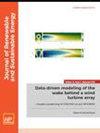Research on the natural frequencies of an integrated offshore wind turbine model considering blades
IF 1.9
4区 工程技术
Q4 ENERGY & FUELS
引用次数: 0
Abstract
The offshore wind turbine (OWT) is a high-rise structure that is extremely sensitive to dynamic loads such as wind, waves, and earthquakes. Therefore, in order to avoid resonance, it is extremely important to accurately calculate the natural frequencies of the OWT at the design stage. The integrated finite element model of DTU (Technical University of Denmark) 10 MW OWT is established based on OpenSees finite element software. The correctness of the superstructure simplification method is confirmed by comparing it to the frequencies calculated by the wind turbine dynamic analysis software HAWC2 for the single-blade model and the fixed constraint model at the bottom of the tower. The frequencies and mode shapes calculated by the overall model are compared with those calculated by the fixed model at the mudline and the concentrated mass model at the top of the tower. Then, the parameters of the soil shear modulus G0, void ratio e, pile embedded length L, pile diameter D, water depth, and blade stiffness are analyzed using the lumped mass model and the blade model at the top of the tower, and some regular conclusions about the variation of natural frequency with the parameters are obtained. Finally, based on the blade model, the influence of short-term cyclic loading on the natural frequency for OWT monopiles in dense sand is studied. The results indicate that the pile-soil interaction has a significant impact on the natural frequencies, the blade has a higher influence on the second bending frequency of the OWT, and the front-after direction is more significantly impacted than the side-side direction. The short-term cyclic loading are unlikely to significantly affect natural frequency for OWT monopiles in dense sand.考虑叶片的综合海上风力机模型固有频率研究
海上风力发电机组是一种高层结构,对风、浪、地震等动力荷载极为敏感。因此,为了避免谐振,在设计阶段准确计算OWT的固有频率是极其重要的。基于OpenSees有限元软件,建立了丹麦技术大学(DTU) 10mw OWT的综合有限元模型。将上部结构简化方法与风力机动力分析软件HAWC2对单叶片模型和塔底固定约束模型计算的频率进行对比,验证了上部结构简化方法的正确性。将整体模型计算的频率和振型与泥线固定模型和塔顶集中质量模型计算的频率和振型进行了比较。然后,采用集总质量模型和塔顶叶片模型,对土体剪切模量G0、空隙比e、桩身长度L、桩径D、水深、叶片刚度等参数进行了分析,得到了固有频率随参数变化的规律性结论。最后,基于叶片模型,研究了短期循环荷载对密砂中单桩固有频率的影响。结果表明:桩土相互作用对桥身固有频率有显著影响,叶片对桥身二次弯曲频率有较大影响,且前后方向受影响比侧面方向更显著;短期循环荷载不太可能显著影响致密砂中单桩的固有频率。
本文章由计算机程序翻译,如有差异,请以英文原文为准。
求助全文
约1分钟内获得全文
求助全文
来源期刊

Journal of Renewable and Sustainable Energy
ENERGY & FUELS-ENERGY & FUELS
CiteScore
4.30
自引率
12.00%
发文量
122
审稿时长
4.2 months
期刊介绍:
The Journal of Renewable and Sustainable Energy (JRSE) is an interdisciplinary, peer-reviewed journal covering all areas of renewable and sustainable energy relevant to the physical science and engineering communities. The interdisciplinary approach of the publication ensures that the editors draw from researchers worldwide in a diverse range of fields.
Topics covered include:
Renewable energy economics and policy
Renewable energy resource assessment
Solar energy: photovoltaics, solar thermal energy, solar energy for fuels
Wind energy: wind farms, rotors and blades, on- and offshore wind conditions, aerodynamics, fluid dynamics
Bioenergy: biofuels, biomass conversion, artificial photosynthesis
Distributed energy generation: rooftop PV, distributed fuel cells, distributed wind, micro-hydrogen power generation
Power distribution & systems modeling: power electronics and controls, smart grid
Energy efficient buildings: smart windows, PV, wind, power management
Energy conversion: flexoelectric, piezoelectric, thermoelectric, other technologies
Energy storage: batteries, supercapacitors, hydrogen storage, other fuels
Fuel cells: proton exchange membrane cells, solid oxide cells, hybrid fuel cells, other
Marine and hydroelectric energy: dams, tides, waves, other
Transportation: alternative vehicle technologies, plug-in technologies, other
Geothermal energy
 求助内容:
求助内容: 应助结果提醒方式:
应助结果提醒方式:


